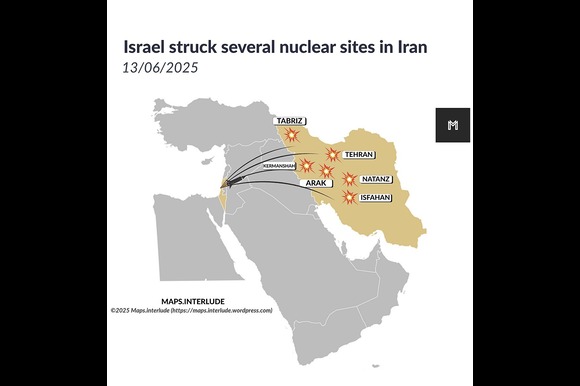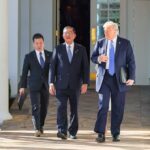A critical nuclear facility in Iran’s Isfahan province was targeted by Israeli airstrikes early Saturday, with Iranian officials confirming there were no radiation leaks following the assault. The attack, which marks the second strike on Isfahan in just over a week, is part of an intensifying conflict between Iran and Israel that has now claimed the lives of at least 430 Iranians and injured nearly 3,500 others, according to Iran’s health ministry.
Residents of Isfahan reported seeing smoke rising from a mountainous area on the outskirts of the city shortly after the attack, which triggered local air defence systems. Iranian authorities stated that no casualties were reported from the Isfahan strike, though the potential risks remain serious.
The Israeli military released imagery and video footage that it claimed depicted the attack on the nuclear facility in Isfahan. Army spokesperson Avichay Adraee said the site is responsible for uranium conversion, a key step following enrichment in the process of developing nuclear weapons. “The air force struck the central facility along with buildings used to produce centrifuges. We continue to strike the Iranian nuclear project,” Adraee stated in a social media post.
Iranian Deputy Health Minister Ali Jafarian said preparations are underway to respond to any fallout from ongoing Israeli strikes on nuclear infrastructure. “We are ready to treat victims suffering from exposure if nuclear reactors are hit. Thankfully, no use of unconventional weapons has been reported so far. We hope it does not come to that,” Jafarian said.
Iranian media also confirmed Israeli attacks on a military base in Shiraz, located in southern Iran’s Fars province, further widening the scope of hostilities.
The conflict has also reached deep into Israeli territory. Explosions were heard over Tel Aviv as Iranian missiles were intercepted, and emergency services responded to fires ignited by falling debris. One blaze was reported on the rooftop of a multi-storey residential building in central Israel. Local media attributed it to remnants of an intercepted missile. Israeli authorities reported that at least 24 people have been killed by Iranian missile attacks during the ongoing escalation.
Adding to the tension, Israeli Defence Minister Israel Katz announced the killing of Saeed Izadi, commander of the Quds Force’s Palestine Corps, during a strike on an apartment in Qom, Iran. Katz called the operation a “major achievement for Israeli intelligence and the Air Force.” He claimed that Izadi had been a central figure in supplying funding and weapons to Hamas in advance of its October 7, 2023, assault on Israel. While Iranian state media confirmed the deaths of five Islamic Revolutionary Guard Corps (IRGC) members in the recent attacks, they did not mention Izadi. The slain commander was listed under US and UK sanctions.
The outbreak of violence began on June 13, when Israel carried out air raids on multiple Iranian military and nuclear sites. Iran responded with a series of retaliatory missile strikes. Israel has defended its actions by arguing that it is acting to prevent Iran from acquiring a nuclear weapon. Tehran, however, insists its nuclear programme remains peaceful and was under active negotiation with the United States in exchange for sanctions relief.
Both the International Atomic Energy Agency and US intelligence agencies have found no concrete evidence suggesting Iran is currently building a nuclear weapon, though the Islamic Republic has enriched uranium beyond civilian-use thresholds. Despite this, former US President Donald Trump disputed those findings on Friday, asserting that US intelligence chief Tulsi Gabbard was “wrong” to say Iran was not pursuing a nuclear bomb.
Iranian government spokesperson Fatemeh Mohajerani told Al Jazeera that Tehran remains committed to dialogue through international platforms like the United Nations. “We believe in listening to the other side. That’s why our diplomats are in Geneva — to engage in dialogue. But any diplomacy must begin with international acknowledgment of Israel’s aggression,” Mohajerani said.
She also highlighted the growing anger within Iran over Israeli strikes that extend beyond military targets. “What is happening on the ground is that ordinary civilians are being hit daily,” she added.
The situation has prompted many in the capital, Tehran — home to over 10 million residents and an additional 4 million in the surrounding province — to flee. The resulting displacement is putting increased pressure on nearby regions, raising fears of a humanitarian crisis as the conflict widens with no clear end in sight.






